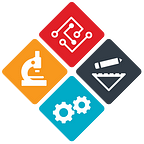Enhancing Rural STEM Education
Students in rural schools face a number of barriers to accessing high-quality science, technology, engineering, and math (STEM) education, including a shortage of science and math teachers, a high rate of teacher turnover, and a lack of access to STEM resources. The scope of the problem cannot be understated — nearly half of all schools and nine million students are considered rural.
The challenges rural schools have faced through the COVID-19 pandemic further illustrate how these barriers set rural students back, ultimately making it harder to compete in tomorrow’s job market. Over the next 10 years, the Bureau of Labor Statistics projects that jobs in computer science will grow by 11 percent, adding about 531,200 new jobs — much faster than the average for all occupations.
United States’ global competitiveness in science and technology is also at stake. To maintain leadership in industries of the future, the U.S. needs to cultivate a stronger domestic workforce highly skilled in STEM. Rural students represent a promising and untapped resource for growth, but support from Congress is necessary to unlock their potential.
House Science Committee Ranking Member Frank Lucas has introduced the bipartisan Rural STEM Research Education Act, which supports rural schools by giving teachers more resources and training in STEM, engaging students though hands-on, place-based education, and increasing access to broadband. Taken together, the measures in the bill will dramatically improve STEM education in rural areas.
In September 2020, the U.S. House of Representatives passed the legislation. Today, Senator Roger Wicker introduced the bill in the Senate, bringing the U.S. closer than ever to enhancing rural access to high-quality STEM education and bolstering American global leadership in science and technology.
As is often said in Congress, this is not a Democrat or Republican issue — it’s an American issue. Global competitiveness in STEM directly impacts our economic prosperity and national security, and growing a robust STEM workforce is a cornerstone to our future in science and technology.
